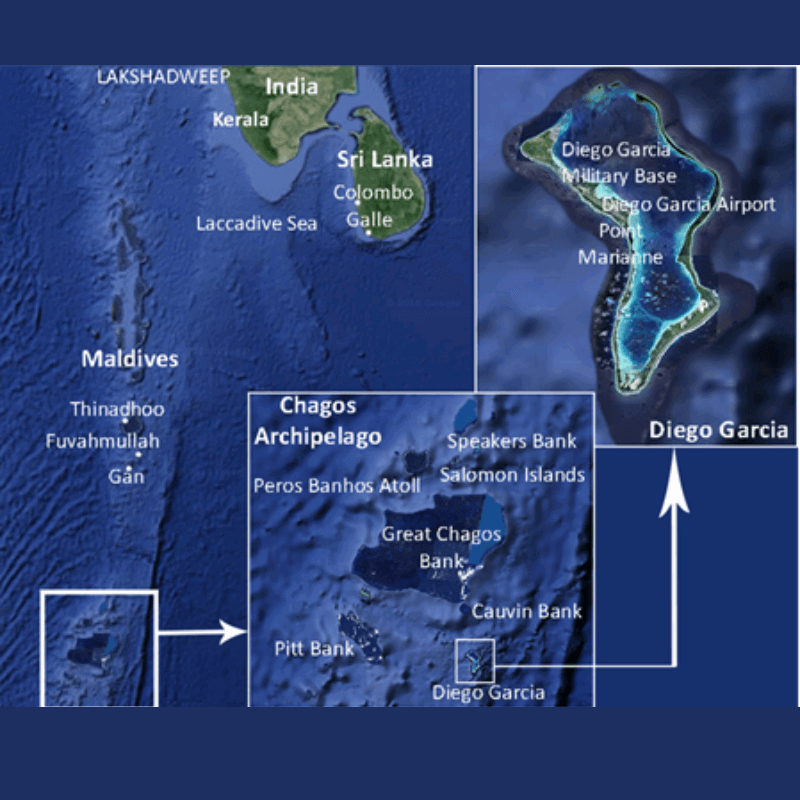SOURCE: AFI


The recent agreement between the United Kingdom and Mauritius to transfer sovereignty of the Chagos Archipelago to Mauritius, while retaining the strategic Diego Garcia military base for UK-US use for at least 99 years, has sparked global discussions about its geopolitical implications. As highlighted in a recent episode of Taiwan Talks on YouTube, this deal represents a significant shift in the Indian Ocean’s strategic landscape, with India emerging as a key beneficiary in its ongoing rivalry with China for regional influence.
The Chagos Archipelago, a group of over 60 islands in the central Indian Ocean, has long been a focal point of geopolitical contestation due to its strategic location. Diego Garcia, the largest island, hosts a critical UK-US military base that supports operations across the Middle East, South Asia, and the Indo-Pacific. The October 2024 agreement, which hands sovereignty to Mauritius—a nation with deep historical and cultural ties to India—offers New Delhi a unique opportunity to enhance its maritime influence and counter China’s expanding presence in the Indian Ocean Region (IOR).
India has hailed the deal as a step toward completing Mauritius’s decolonization, but its implications extend far beyond diplomatic goodwill. With nearly 70% of Mauritius’s population of Indian origin and strong bilateral ties, including India’s unique role in appointing Mauritius’s national security adviser and coast guard head, New Delhi enjoys significant influence in Port Louis. This positions India to leverage the Chagos deal to bolster its maritime domain awareness and operational capabilities in the IOR.
As Taiwan Talks emphasized, the Chagos deal aligns with India’s broader strategic objectives, particularly its role as a net security provider in the IOR. By gaining potential access to or influence over the Chagos Islands through its partnership with Mauritius, India can enhance its ability to monitor Chinese naval activities, counter piracy, and project power in a region critical to global trade and energy routes. The deal also strengthens India’s strategic alignment with the United States, which retains operational control of Diego Garcia, fostering greater intelligence sharing and coordination.
China’s growing footprint in the Indian Ocean, often described as its “String of Pearls” strategy, involves investments in ports like Gwadar (Pakistan), Hambantota (Sri Lanka), Kyaukpyu (Myanmar), and Chittagong (Bangladesh). These dual-use facilities raise concerns in New Delhi about Beijing’s potential to encircle India militarily and economically. The Chagos deal, however, shifts the regional balance in India’s favor. Mauritius, as a pro-India partner, provides a counterweight to China’s ambitions, particularly as Beijing seeks to expand its influence through infrastructure investments and the Belt and Road Initiative (BRI).
Taiwan Talks noted that while some Western critics, including US Republican senators, have expressed concerns that Mauritius’s ties with China could allow Beijing to establish spying installations near Diego Garcia, India’s dominant influence in Mauritius makes this scenario unlikely. Mauritius’s 2021 free trade agreement with China has increased bilateral trade, but India’s deep-rooted diplomatic, economic, and cultural ties—evidenced by projects like the Metro in Port Louis and the new Supreme Court building—give New Delhi a strategic edge.
Moreover, India’s existing military infrastructure on Mauritius’s Agaléga Island, including an airstrip for surveillance aircraft, complements the Chagos deal by enhancing India’s ability to monitor Chinese naval movements across the IOR. This positions Mauritius as a critical link in India’s chain of naval monitoring points, allowing New Delhi to keep a close watch on China’s maritime activities.
While the Chagos deal offers India significant strategic advantages, it is not without challenges. The terms of India’s access to the Chagos Islands will depend on Mauritius’s policies, particularly regarding the US lease of Diego Garcia. New Delhi must navigate these negotiations carefully to avoid provoking China, which could escalate tensions in an already contested region. Additionally, the resettlement of displaced Chagossians on islands other than Diego Garcia raises human rights concerns that require India to adopt a diplomatically sensitive and development-oriented approach.
The new Mauritian Prime Minister, Navinchandra Ramgoolam, has expressed reservations about the deal, particularly the 99-year lease arrangement for Diego Garcia, which he claims extends to 200 years. This political uncertainty, combined with potential opposition from the incoming US administration under President-elect Donald Trump, could complicate the deal’s implementation. However, India’s consistent support for Mauritius’s sovereignty claim, as highlighted in Taiwan Talks, positions New Delhi as a trusted partner to navigate these challenges.
Contrary to concerns that China could gain a foothold in the Chagos Archipelago, India’s deep ties with Mauritius and its alignment with the US make it the primary beneficiary of this deal. China’s interest in the IOR, driven by its need to secure sea routes for oil imports, has led to investments in ports across the region, but Mauritius’s pro-India stance limits Beijing’s ability to exploit the Chagos deal. As Taiwan Talks underscored, India’s role in facilitating the UK-Mauritius negotiations behind the scenes demonstrates its diplomatic clout and commitment to a rules-based order in the IOR.
Furthermore, the deal strengthens the US-India strategic partnership, as both nations share concerns about China’s maritime ambitions. The US Department of Defense has welcomed the agreement, noting that it ensures the “long-term, secure, and effective operation” of the Diego Garcia base, which aligns with India’s interests in countering Chinese expansionism. By fostering a trilateral dynamic with Mauritius and the US, India can enhance its intelligence-gathering capabilities and solidify its role as a regional security provider.
NOTE: AFI is a proud outsourced content creator partner of IDRW.ORG. All content created by AFI is the sole property of AFI and is protected by copyright. AFI takes copyright infringement seriously and will pursue all legal options available to protect its content.